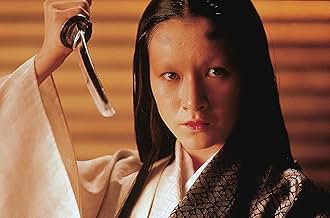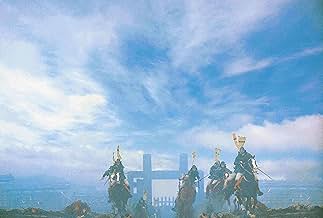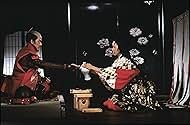Ran
- 1985
- Tous publics
- 2h 40m
In Medieval Japan, an elderly warlord retires, handing over his empire to his three sons. However, he vastly underestimates how the new-found power will corrupt them and cause them to turn o... Read allIn Medieval Japan, an elderly warlord retires, handing over his empire to his three sons. However, he vastly underestimates how the new-found power will corrupt them and cause them to turn on each other...and him.In Medieval Japan, an elderly warlord retires, handing over his empire to his three sons. However, he vastly underestimates how the new-found power will corrupt them and cause them to turn on each other...and him.
- Won 1 Oscar
- 30 wins & 23 nominations total
Mansai Nomura
- Tsurumaru
- (as Takeshi Nomura)
Summary
Reviewers say 'Ran' is celebrated for its epic scale, masterful direction, and stunning visuals. Adapted from Shakespeare's 'King Lear,' it is lauded for its intricate narrative, powerful performances by Tatsuya Nakadai and Mieko Harada, and deep exploration of power, corruption, and betrayal. The cinematography and battle scenes are noted for their grandeur. Some find its slow pace and long runtime challenging, yet it is often hailed as one of Kurosawa's finest works.
Featured reviews
Based on Shakespeare's King Lear, this film follows the story of the aging warlord Hidetora who, in an attempt to restore peace, divides his kingdom between his three sons - Taro, Jiro, and Saburo - and retires from his duties. However, one of his sons sees this as unwise and is banished by his father, leaving his two brothers in charge of two of the three castles left in their hands. It isn't long before they are overtaken by greed and eventually betray their father, leaving him in the hands of a philosophical jester and a loyal retainer. This betrayal ultimately leads to war, dividing the family and driving Hidetora insane.
The remarkable script, which contains many of my favorite lines from any film, still manages to break its way through the confinement of subtitles and reveals itself to be one of the richest Kurosawa ever wrote. He has obviously worked equally hard on the look and feel of the film - the cinematography being excellent (example: the long, continuous shot of Saburo's men charging on horseback across a river).
There's also something rather frightening about it that I can't quite put my finger on. The first battle, which is the film's turning point, is the most horrifying, yet strangely beautiful, battles ever filmed. A good effect used is the loss of sound, with only Toru Takemitsu's haunting score to be heard. The entire battle lasts less than ten minutes and there is no uplifting or bombastic music to be heard, but in my opinion, it's Ran's finest scene, and thus the finest scene ever.
What Kurosawa managed to get rather than give though was excellent performances from his actors, none more brilliant than Tatsuya Nakadai's Hidetora, Mieko Harada as Lady Kaede (a woman similar to Lady Macbeth but with a different hidden agenda), and the strangely-named Peter as Kyoami.
The remarkable script, which contains many of my favorite lines from any film, still manages to break its way through the confinement of subtitles and reveals itself to be one of the richest Kurosawa ever wrote. He has obviously worked equally hard on the look and feel of the film - the cinematography being excellent (example: the long, continuous shot of Saburo's men charging on horseback across a river).
There's also something rather frightening about it that I can't quite put my finger on. The first battle, which is the film's turning point, is the most horrifying, yet strangely beautiful, battles ever filmed. A good effect used is the loss of sound, with only Toru Takemitsu's haunting score to be heard. The entire battle lasts less than ten minutes and there is no uplifting or bombastic music to be heard, but in my opinion, it's Ran's finest scene, and thus the finest scene ever.
What Kurosawa managed to get rather than give though was excellent performances from his actors, none more brilliant than Tatsuya Nakadai's Hidetora, Mieko Harada as Lady Kaede (a woman similar to Lady Macbeth but with a different hidden agenda), and the strangely-named Peter as Kyoami.
Thankee kindly.
Kurosawa, while a great director, isn't somebody whose films I blindly endorse.
However, Ran takes the cake. It easily makes my personal top five films any time I think about it.
The imagery is absolutely stunning, and the dialogue is quite clever. The battle scenes are suitably horrific, and the humor (and yes, there is humor) is subtle enough not to get in the way.
All told, one of the greatest films it's been my privilege to see. I watched it to get the nightmare that was Cold Mountain out of my head, as proof that long movies can actually be epic, as opposed to boring, trite, and predictable.
Kurosawa, while a great director, isn't somebody whose films I blindly endorse.
However, Ran takes the cake. It easily makes my personal top five films any time I think about it.
The imagery is absolutely stunning, and the dialogue is quite clever. The battle scenes are suitably horrific, and the humor (and yes, there is humor) is subtle enough not to get in the way.
All told, one of the greatest films it's been my privilege to see. I watched it to get the nightmare that was Cold Mountain out of my head, as proof that long movies can actually be epic, as opposed to boring, trite, and predictable.
With RAN (1985) Akira Kurosawa seems to be setting up a macarbe trap. The first section of the film is slow, following an aging warlord (Tatsuya Nakadai's best acting in a long wonderous career.) dividing his castles amongst his unsavory sons. The action is slow, people talk in low tones, it's almost at snail's pace. But then, a battle scene like nothing you ever seen before explodes on the screen. The film takes a 180 degree turn and becomes more and more sinister, more compelling. You can't look away.
Akira Kurosawa (1910-1997) was responsible for elevating Japanese cinema to a front-runner in world cinema. Two of his films, RASHOMON and SEVEN SAMURAI were made in less than ten years after World War II. These films put a spotlight on Japanese culture. Some of his later films, THE HIDDEN FORTRESS, THE BAD SLEEP WELL, YOJIMBO and HIGH AND LOW became the basis for a good percentage of the major American films produced after 1960.
If you sit down to see RAN, be prepared for a jaw-dropping experience.
Akira Kurosawa (1910-1997) was responsible for elevating Japanese cinema to a front-runner in world cinema. Two of his films, RASHOMON and SEVEN SAMURAI were made in less than ten years after World War II. These films put a spotlight on Japanese culture. Some of his later films, THE HIDDEN FORTRESS, THE BAD SLEEP WELL, YOJIMBO and HIGH AND LOW became the basis for a good percentage of the major American films produced after 1960.
If you sit down to see RAN, be prepared for a jaw-dropping experience.
Akira Kurosawa's 1985, Ran, is based one of Shakespeare's greatest works, King's Lear. The Film proudly stands along with his other classic such as Seven Samurai, Yojimbo, Roshomon, Sanjuro and the Hidden Fortress. He is a master in the art of filmmaking, no one can film an epic battle scene quite like Kurosawa. This is recognized as the most expensive film ever made by Akira Kurosawa, it was at that time, Japan's most expensive film ever. Being at the age of 75, he still showed us, he's one of the best in the business.
This movie is about an aging lord, head of the Ichimonji family, decides to retire and to pass the power to Taro, the eldest of his three sons. He will however have to banish Saburo, the youngest one, who dared to speak the truth to him. Soon, the former lord is chased away from the castles of his sons and becomes mad when he understands that one of his sons is trying to kill him. The three brothers are fighting for control of the Kingdom, as their lust for power grows every day. Four armies are facing each other on the prairie. Lord Ichimonji's former peaceful kingdom is nothing but a distant memory.
Akira Kurosawa redefines what an epic film is, with astonishing story telling, entirely believable characters and real life battle scenes without the use of Special effects/CGI. He retells the story of King Lear in his own way and no one would recognize that it was actually a adaptation beforehand. But just like Shakespeare, there is humor, irony, death and not a happy ending. Everyone who played a part in the production of this film, deserves some kind of recognition. The acting is pretty much excellent and certainly believable.
10/10 Kurosawa is a Genius
This movie is about an aging lord, head of the Ichimonji family, decides to retire and to pass the power to Taro, the eldest of his three sons. He will however have to banish Saburo, the youngest one, who dared to speak the truth to him. Soon, the former lord is chased away from the castles of his sons and becomes mad when he understands that one of his sons is trying to kill him. The three brothers are fighting for control of the Kingdom, as their lust for power grows every day. Four armies are facing each other on the prairie. Lord Ichimonji's former peaceful kingdom is nothing but a distant memory.
Akira Kurosawa redefines what an epic film is, with astonishing story telling, entirely believable characters and real life battle scenes without the use of Special effects/CGI. He retells the story of King Lear in his own way and no one would recognize that it was actually a adaptation beforehand. But just like Shakespeare, there is humor, irony, death and not a happy ending. Everyone who played a part in the production of this film, deserves some kind of recognition. The acting is pretty much excellent and certainly believable.
10/10 Kurosawa is a Genius
The 'Kurosawa' adaptation of King Lear in his film 'Ran' is a tremendous memorable film.
It is a very dramatic film with many soliloquies and dialogue, but if you are patient with it, you are treated to some of the most epic scenes of cinematic brilliance that Kurosawa made. After all it is Shakespeare and one must be patient with it if they are not a fan of the old school theatre.
Colourfull clashing armies, The lord awaiting his fate in a burning castle, a brilliant execution scene (I consider the BEST I have ever seen film ever), and the blind being left in the hands of Buddha?
While Seven Samurai will always be his perfection, Ran is more than an enjoyable movie that should be seen. Just stick with it and you'll never forget it.
Rating 9 out of 10.
It is a very dramatic film with many soliloquies and dialogue, but if you are patient with it, you are treated to some of the most epic scenes of cinematic brilliance that Kurosawa made. After all it is Shakespeare and one must be patient with it if they are not a fan of the old school theatre.
Colourfull clashing armies, The lord awaiting his fate in a burning castle, a brilliant execution scene (I consider the BEST I have ever seen film ever), and the blind being left in the hands of Buddha?
While Seven Samurai will always be his perfection, Ran is more than an enjoyable movie that should be seen. Just stick with it and you'll never forget it.
Rating 9 out of 10.
Did you know
- TriviaAkira Kurosawa's wife of 39 years, Yôko Yaguchi, died during the production of this film. Kurosawa halted filming for just one day to mourn before resuming work on the picture.
- GoofsDuring the siege on the third castle, the corpse of one of Hidetora's guards suddenly shuts his eyes just before a volley of arrows flies past him.
- ConnectionsFeatured in A.K. (1985)
Details
Box office
- Budget
- $11,500,000 (estimated)
- Gross US & Canada
- $4,314,927
- Opening weekend US & Canada
- $3,567
- Jul 2, 2000
- Gross worldwide
- $4,387,958
- Runtime
- 2h 40m(160 min)
- Color
- Aspect ratio
- 1.85 : 1
Contribute to this page
Suggest an edit or add missing content























